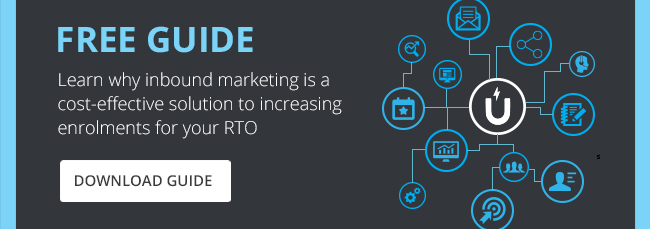
Optimising your website for search engines is essential if you want to attract more prospects to your Registered Training Organisation (RTO) and increase your conversion rates. But many organisations find the idea of search engine optimisation daunting and turn to the help of experienced SEO consultants to achieve this. Instead of going this route, here are some key things you can do to ensure SEO and inbound marketing success:
On-site optimisation
Many of the critical elements for Search Engine Optimisation occur on your own website. These are some of the essential elements you should have on your website’s main pages and the homepage:
- The title tag: The title tag on pages of your website tells search engines what the page is about. It should be 70 characters or less and include your business or brand name and keywords that relate to that specific page only. This tag is placed between the <HEAD> </HEAD> tags near the top of the HTML code for the page.
- The meta description: Having this on pages of your website gives search engines a little more insight into what your page is about. Write your meta description with your student personas in mind and include the page’s main keywords, as the meta description does show up in search results. It should be between 150-160 characters.
- Internal links: Link building isn’t just reserved for external sites linking to your website. You can help search engines learn more about your website by internally linking to other pages on your website within your content.
- Header tags: This blog post utilises three different levels of HTML header tags that help break the content into sections as well as let search engines know more about what each section of content is about. The <H1></H1> tags surround the post title – there should only be one set of <H1></H1> tags per page. The <H2></H2> and <H3></H3> tags surround subheadings on the page – there can be multiple instances of both.
- Image name & ALT tags: If you use images on your website, you should think of good keywords for both the image name and the ALT tag. This helps search engines find good images for their image search based on the keywords specified.
- Bolded text: Don’t overuse this, but you can occasionally bold a selection of text to get a reader’s attention, and it can also help search engines distinguish other important information and keywords in the page’s content.
Relevant and up-to-date content
Your content is the foundation of all your inbound marketing efforts – from email to social. You need to create content that is impactful, appeals to your audience and drives sharing. Search engines equate high-quality content with high-quality websites and the more engagement you get, the more Google considers your content to be of high value and boosts your SEO rankings
Ways in which content generates leads:
- The right content attracts your target market to your site
- Engaging content attracts visitors and compels them to relinquish information about themselves in exchange for more content
- Once your visitors have become leads, you can keep them engaged through targeted lead nurturing emails until they eventually become paying customers
- You can use your content to generate social shares and inbound links to attract an even bigger audience
- The right content positions your brand as a thought leader or driver in its industry space and influences future purchases
Quality content can include a variety of things including, but not limited to, the following: blog posts, industry articles, tutorials & how to guides, infographics, videos and podcasts.
Feel empathy for your prospects
One of the most important elements to building an online marketing strategy around SEO is empathy for your audience. Once you grasp what your target market is looking for, you can more effectively reach and keep those users.
Focus on pain points and challenges your personas may face. They will be searching for answers, so if you have your keywords optimised, and the content to answer their questions, you’ll be positioning yourself as a thought leader in this space. A good tip is to use long tail keywords that your prospects are most likely to use.
Lupo Digital is an inbound marketing agency that specialises in inbound marketing and optimising websites for conversion. For more information about SEO and inbound marketing work for RTOs, download our executive guide to inbound marketing for RTOs.

Written by Michael Wolf
Founder of Lupo Digital, Michael is extremely passionate about digital and inbound marketing. Michael helps organisations drive rapid and sustainable customer and revenue growth.
SUBSCRIBE TO OUR BLOG
SUBSCRIBE TO OUR BLOG
Popular
Categories
- Inbound Marketing (97)
- Digital Marketing Strategy (85)
- HubSpot (46)
- CRM (43)
- Artificial Intelligence (AI) (39)
- Content Marketing (35)
- Business Growth (27)
- Lead Management (27)
- Marketing Automation (26)
- Email Marketing (20)
- Customer Relationship Management (CRM) (16)
- HubSpot Product Feature Updates (16)
- Sales Enablement (14)
- Referral Marketing (12)
- content strategy (10)
- Social Media Marketing (8)
- Blogging (7)
- Buyer Personas (7)
- Goal Setting (7)
- Growth Driven Website Design (7)
- Buyer Journey (6)
- SEO (5)
- Paid Media (4)
- Conversational Marketing (2)
- Influencer Marketing (2)
- Sales & CRM HUG ANZ (2)
- Customer Experience (1)
- Data Management (1)
- HubSpot CRM (1)
- Legal practice management software (1)
- User Management (1)
- training (1)



